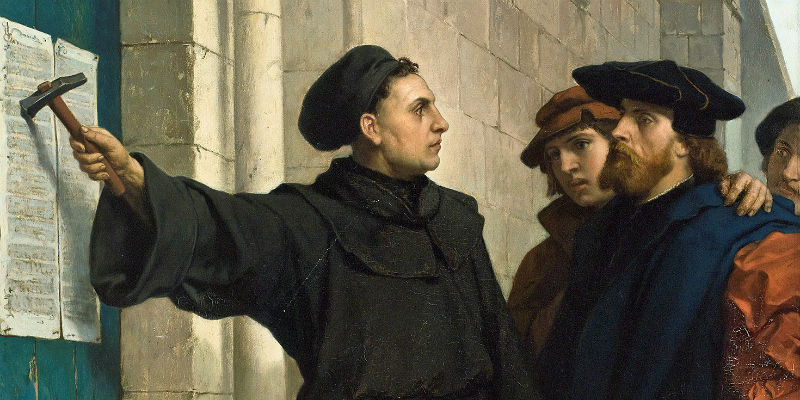Protestant Christians: Lutheran beliefs and practices

Being one of the oldest Protestant denominations, Lutheranism traces its basic beliefs and practices in the teachings of Martin Luther (1483-1546), a German friar in the Augustinian order known as "Father of the Reformation".
Luther was a Bible scholar and strongly believed that all doctrine should be solidly based on Scripture. He rejected the idea that the Pope's teaching had the same weight as the Bible.
Initially, Luther only sought to reform himself in the Roman Catholic Church, but Rome claimed that the Pope's office had been established by Jesus Christ and that the Pope served as vicar or representative of Christ on earth. Therefore the church rejected any attempt to limit the role of the Pope or cardinals.
Lutheran beliefs
As Lutheranism evolved, some Roman Catholic customs were maintained, such as the use of clothing, an altar and the use of candles and statues. However, Luther's main deviations from Roman Catholic doctrine were based on these beliefs:
Baptism - Although Luther claimed that baptism was necessary for spiritual regeneration, no specific form was entered into. Today Lutherans practice both the baptism of children and the baptism of believing adults. Baptism is done by spraying or pouring water instead of immersion. Most Lutheran branches accept valid baptism from other Christian denominations when a person converts, making rebaptism superfluous.
Catechism: Luther wrote two catechisms or guides to the faith. The Small Catechism contains basic explanations on the Ten Commandments, the Apostles' Creed, the Lord's Prayer, baptism, confession, communion and a list of prayers and function table. The great catechism deepens these topics.
Church governance - Luther argued that individual churches should be governed locally, not by a centralized authority, as in the Roman Catholic Church. Although many Lutheran branches still have bishops, they do not exercise the same type of control over congregations.
Credo - Today's Lutheran churches use the three Christian creeds: the Apostles' Creed, the Nicene Creed and the Athanasius Creed. These ancient professions of faith summarize basic Lutheran beliefs.
Eschatology: Lutherans do not interpret kidnapping like most other Protestant denominations. Instead, Lutherans believe that Christ will return only once, visibly, and will reach all Christians together with the dead in Christ. Tribulation is the normal suffering that all Christians endure until the last day.
Heaven and Hell - Lutherans see heaven and hell as literal places. Paradise is a kingdom where believers enjoy God forever, free from sin, death and evil. Hell is a place of punishment where the soul is eternally separated from God.
Individual Access to God - Luther believed that every individual had the right to reach God through Scripture with a responsibility to God alone. It is not necessary for a priest to mediate. This "priesthood of all believers" was a radical change from Catholic doctrine.
The Lord's Supper - Luther kept the sacrament of the Lord's Supper, which is the central act of worship in the Lutheran denomination. But the doctrine of transubstantiation was rejected. While Lutherans believe in the true presence of Jesus Christ in the elements of bread and wine, the church is not specific about how or when that act occurs. Therefore, Lutherans resist the idea that bread and wine are simple symbols.
Purgatory - Lutherans reject the Catholic doctrine of purgatory, a place of purification where believers go after death before entering heaven. The Lutheran Church teaches that there is no scriptural support and that the dead go directly to heaven or hell.
Salvation by grace through faith - Luther maintained that salvation comes by grace only through faith; not for works and sacraments. This key doctrine of justification represents the main difference between Lutheranism and Catholicism. Luther argued that works such as fasting, pilgrimages, novenas, indulgences and masses of special intention have no role in salvation.
Salvation for all - Luther believed that salvation was available to all humans through the redemptive work of Christ.
Scriptures - Luther believed that the scriptures contained the only necessary guide to truth. In the Lutheran Church, much emphasis is placed on listening to the Word of God. The church teaches that the Bible does not simply contain the Word of God, but every word of it is inspired or "breathed by God". The Holy Spirit is the author of the Bible.
Lutheran practices
Sacraments - Luther believed that the sacraments were valid only as an aid to faith. The sacraments begin and nourish the faith, thus giving grace to those who participate in it. The Catholic Church claims seven sacraments, the Lutheran Church only two: baptism and the Lord's Supper.
Worship - Regarding the way of worship, Luther chose to keep altars and vestments and prepare an order of liturgical service, but with the awareness that no church was required to follow a certain order. As a result, emphasis is now placed on a liturgical approach to worship services, but no uniform liturgy belongs to all branches of the Lutheran body. An important place is given to preaching, congregational singing and music, as Luther was a huge fan of music.